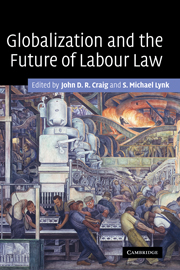Book contents
- Frontmatter
- Contents
- Notes on contributors
- Acknowledgements
- Table of cases
- List of abbreviations
- Introduction
- PART I Perspectives on globalization
- PART II International labour standards
- PART III The European Union
- PART IV The Americas
- PART V The ILO
- PART VI Labour rights
- 14 Securing gender justice: the challenges facing international labour law
- 15 International labour law and the protection of migrant workers: revitalizing the agenda in the era of globalization
- Bibliography
- Index
15 - International labour law and the protection of migrant workers: revitalizing the agenda in the era of globalization
Published online by Cambridge University Press: 23 July 2009
- Frontmatter
- Contents
- Notes on contributors
- Acknowledgements
- Table of cases
- List of abbreviations
- Introduction
- PART I Perspectives on globalization
- PART II International labour standards
- PART III The European Union
- PART IV The Americas
- PART V The ILO
- PART VI Labour rights
- 14 Securing gender justice: the challenges facing international labour law
- 15 International labour law and the protection of migrant workers: revitalizing the agenda in the era of globalization
- Bibliography
- Index
Summary
“… Labour is not a commodity”
“All human beings, irrespective of race, creed or sex, have the right to pursue both their material well-being and their spiritual development in conditions of freedom and dignity, of economic security and equal opportunity”
Declaration of Philadelphia 1944.Introduction
The protection of migrant workers raises profound challenges for the role and efficacy of international labour law in the era of globalization. It is easy to be sceptical about future developments. The process of globalization has arguably widened the income gap between the traditional migrant receiving and sending countries, and the demand for cheap labour in the context of increasing and intense pressures to reduce labour costs threatens the continuation of an established international regime protecting the employment and human rights of migrant workers. The richer countries appear to hold all the cards in this process with the result that poorer countries have nominal bargaining power regarding the treatment of their workers abroad. Moreover, the standards adopted by the ILO and the UN to provide for migrant workers remain poorly ratified and inadequately implemented and the prospects for numerous further ratifications appear rather slim despite the considerable efforts undertaken to promote these standards, especially by civil society. Official resources for the promotion of the ratification of these instruments have also been lacking, a position often attributable to a perceived collusion among major receiving countries as well as between competent authorities in sending countries and private recruitment agencies not to further the issue of the protection of migrant workers.
- Type
- Chapter
- Information
- Globalization and the Future of Labour Law , pp. 409 - 444Publisher: Cambridge University PressPrint publication year: 2006
- 9
- Cited by



